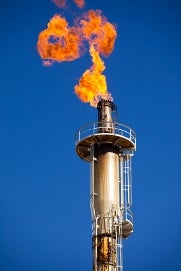This piece was co-authored with Günther Schulze1.
 Kenya may have found oil in Turkana that could change the development trajectory for the country. In 2011, Kenya spent US$ 4.1 billion on oil imports, equivalent to approximately 100,000 barrels per day. For Kenya to become a net oil exporter, the resources in Turkana would need to be substantial and similar to those of Sudan or Chad.
Kenya may have found oil in Turkana that could change the development trajectory for the country. In 2011, Kenya spent US$ 4.1 billion on oil imports, equivalent to approximately 100,000 barrels per day. For Kenya to become a net oil exporter, the resources in Turkana would need to be substantial and similar to those of Sudan or Chad.
If indeed Kenya has substantial oil reserves, will they benefit the country in the long-term?
Some observers are predicting similar problems as in Nigeria, Equatorial Guinea and many other resource-rich African countries where corruption has been amplified.
Others argue that this need not be the case. Countries as diverse as Botswana, Chile and Norway have shown that natural resources can be a blessing. If managed well, they can even support the fight against poverty by providing the resources needed to scale up the delivery of public services. In the last ten years, many of the world’s fastest growing economies, including in Africa, have benefitted from exporting natural resources.
So who should we believe?
Let’s zoom in on the symptoms of the “resource curse” and how they can be mitigated. A resource boom increases exports which typically leads to a stronger currency. This hurts the (non-oil) export and import-competing sectors. The government has more resources, but the ‘stronger’ shilling further accentuates Kenya’s economic imbalance. Starting the “second engine” – exports in manufacturing –becomes even more difficult. In the extreme, this leads to de-industrialization. This is the “Dutch Disease” scenario, a term that was coined by The Economist to describe the incapacity of the Netherlands to benefit (initially) from its natural gas finds in the North Sea. But this ‘disease’ is not fatal and it can be prevented. This requires a mix of industrial, labor market, trade and exchange rate policies that enhance the country competitiveness in the non-commodity sector, for example in lowering taxes on labor.
More worryingly, the sudden wealth that comes from natural resources can erode the quality of institutions. Politicians may be less pressured to undertake needed reforms and the windfall revenue may be spent on “white elephants” (non-productive prestige projects) or large transfer schemes that end up benefitting the political elite. Many talented individuals will be tempted to seek rents rather than productive activities and corruption can increase. In Sao Tome and Principe (STP), corruption went up significantly after oil discoveries were announced in 1997-99. By contrast, Cape Verde which was very similar to STP managed to tame corruption in the absence of oil. Again, ills of oil can be avoided as they are largely man-made. Since oil is a long-term resource, it should be matched with long-term investments in education, health, and infrastructure, as well as savings that will benefit future generations.
Indonesia is a rarely discussed case and its track-record has been mixed. It is a member of OPEC, but it has been a net-importer of oil since 2003 (it remains a big exporter of natural gas). In terms of managing its revenues from natural resources it is neither a great success nor a spectacular failure. The country also implemented massive decentralization, which implied re-working how natural resources revenues would be shared.
Here are two main lessons for Kenya from Indonesia:
First, no matter how high oil prices go and how strong the temptation for politicians, establishing price ceilings or introducing energy subsidies are losing strategies with dramatic effects. Over the last decade, Indonesia has spent an average of 11 percent of its budget (US$ 10 billion) per year on wasteful fuel subsidies. They are wasteful because they mainly benefit the rich– who own cars. They are also detrimental to the environment because pollution is being subsidized.
Second, a new revenue sharing mechanism with the regions will be needed. In Indonesia, most of the oil and gas are extracted in remote regions of the country. The most prominent is Papua which – just like Turkana – has a huge land mass but very few people. Thanks to a special autonomy arrangement, Papua has been receiving 70 percent of revenues from oil and gas produced on its soil. Since 2000 its revenues increased fivefold as a result. This poor province is now flush with cash. Now Papua’s key challenge is not to generate additional revenues but to use the existing resources wisely (see also next story).
The biggest -but most important- challenge is to build and maintain good institutions. “Sunlight is the best anti-septic”, in other words transparency will be the most powerful lever for accountability. If Kenyans know exactly how much oil is being produced, how much royalties oil companies pay this would already be a major step in the right direction. Next, a transparent sharing formula would help manage expectation on how much each unit/level of government can expect to receive. Kenya’s strong civil society and creative industries, especially in ICT, can play a strong role in monitoring the oil revenue flows and proposing solutions on how to spend the money well. Then the resource curse can be turned into a blessing.
1. Günther Schulze is a Professor of Economics at the University of Freiburg, Germany


Join the Conversation